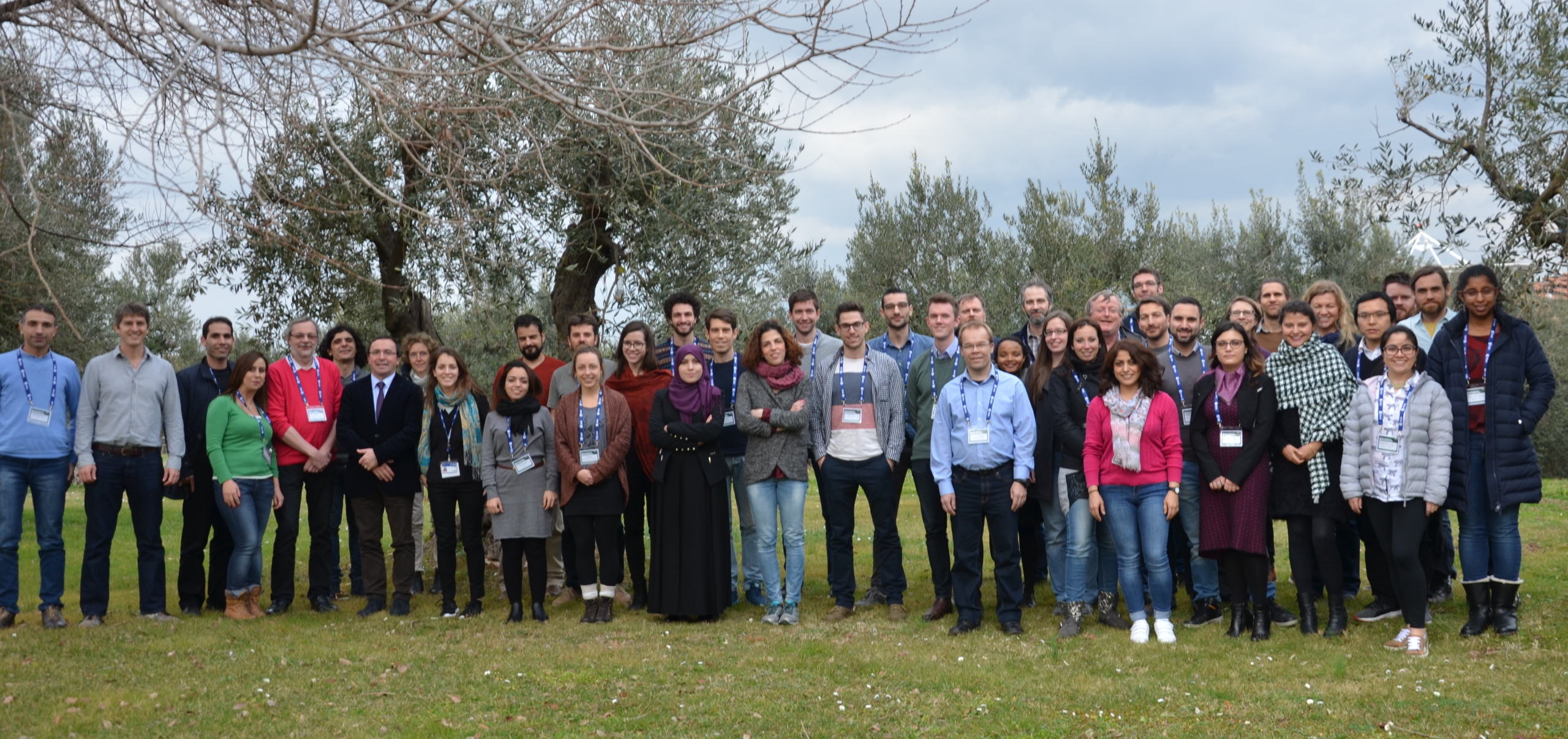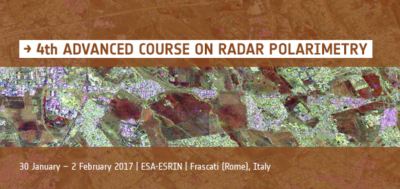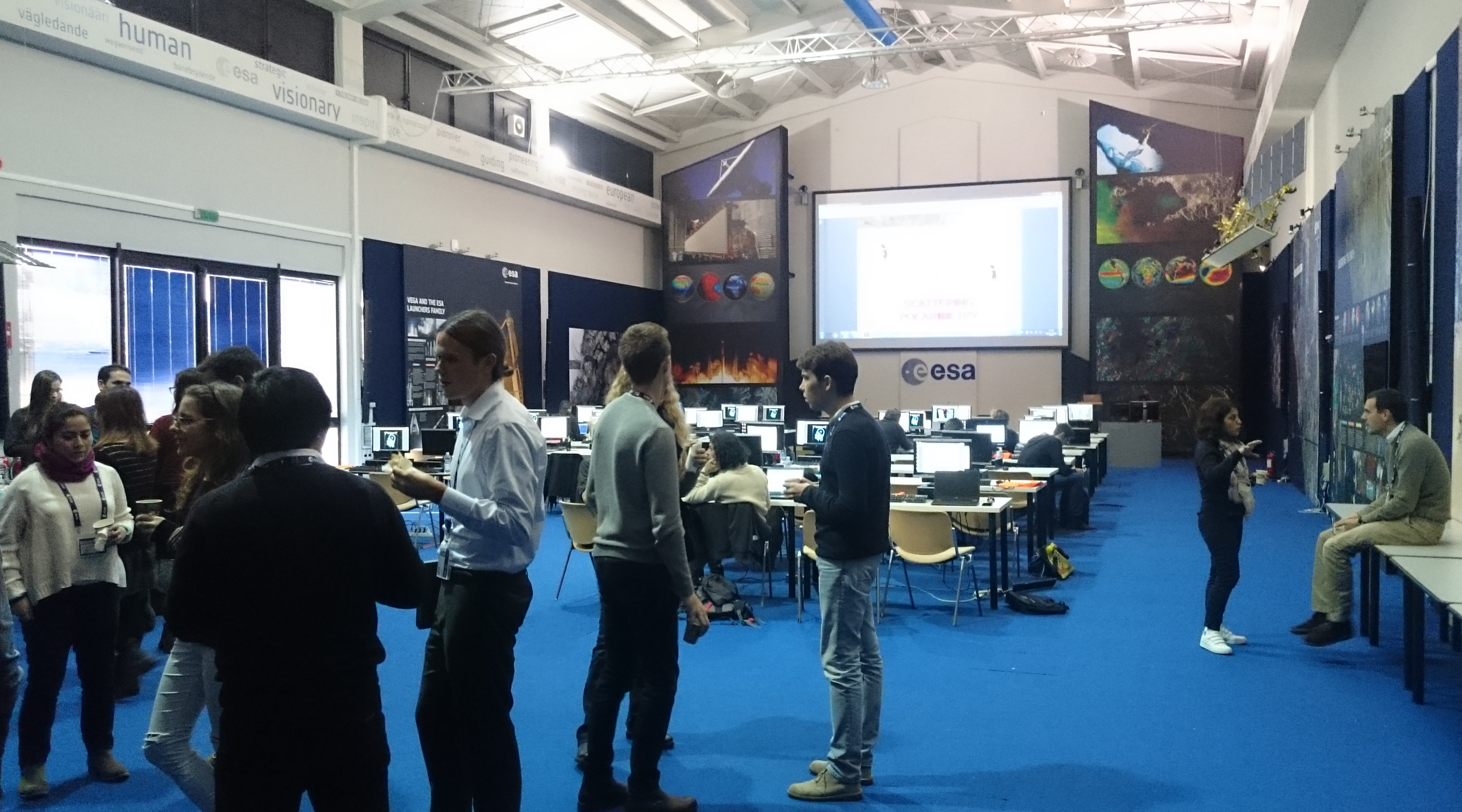Using European Space Agency expertise to grow better crops
22/02/2017

When you hear the words European Space Agency (ESA), ambitious missions to mars or spectacular crash-landings on comets may come to mind. What is less likely to occur is agriculture and improving crop yields. But earlier this month (6th-9th February 2017), I attended the 4th ESA Advanced Course on Radar Polarimetry taking place in ESA-ESRIN, Frascati (Italy) for those very reasons.
 This free course was an excellent opportunity to meet experts in the field of Polarimetric Synthetic Aperture Radar (PolSAR) and to learn more about the potentials and limitations of this technique. PoISAR is a measurement system based on Radar (an antenna on-board a satellite/plane emits an electromagnetic wave down the Earth and records the echo from the land surface) able to record signals at different polarisations…think of it as a camera recording different colours. These polarisations are sensitive to different characteristics (structure, water content, etc.) of the imaged scene.
This free course was an excellent opportunity to meet experts in the field of Polarimetric Synthetic Aperture Radar (PolSAR) and to learn more about the potentials and limitations of this technique. PoISAR is a measurement system based on Radar (an antenna on-board a satellite/plane emits an electromagnetic wave down the Earth and records the echo from the land surface) able to record signals at different polarisations…think of it as a camera recording different colours. These polarisations are sensitive to different characteristics (structure, water content, etc.) of the imaged scene.
As a research fellow in Remote Sensing within the Cranfield Soil and Agrifood Institute, I am often involved in research projects looking at detecting crop growth stages, or estimating yield. I was looking forward to learning more about PolSAR, which has many applications in Remote Sensing of vegetation, from measuring tree heights or biomass in the Amazon and the Boreal forests, to detecting objects concealed under vegetation.
Course review
Well, the course went beyond my expectations. It covered the principles of PolSAR, with a focus on advanced measurement techniques like polarimetric interferometry (Pol-InSAR) and polarimetric tomography (Pol-TomoSAR). The morning lectures were very informative, with engaging experts always happy to discuss the numerous questions of the audience (mainly PhD students and Post-Docs). The afternoon practical sessions were well thought out and very useful as teaching PolSAR often relies on a series of mathematical concepts. All this was punctuated by presentations on the latest Earth Observation missions and their scientific results. Beyond the great learning experience, the course was also a good platform for networking with other scientists in universities and in companies involved in SAR Remote Sensing.

The Colosseum, Rome
Frascati is only 30 minutes away from Rome, meaning I had time to make an express visit to the main historical sights (the Colosseum, Pantheon, Trevi Fountain, Vatican), and a typical Italian ice cream of course!
But back to work! The ESA runs various free events within the context of the Scientific Exploitation of Operational Missions program (SEOM). SEOM’s aims include stimulating research, training scientists, and promoting data use and results. In practice, this is done by regularly organising free workshops, short courses, and summer schools on various remote sensing topics covering land, ocean, atmosphere, and cryosphere. And if you miss an event, all the materials are usually made freely available on the ESA-SEOM website. I would definitely recommend this type of courses to any scientists interested in Earth Observation, from MSc students to lecturers.

The lecture room at ESA-ESRIN
Categories & Tags:
Leave a comment on this post:
You might also like…
From classroom to cockpit: What’s next after Cranfield
The Air Transport Management MSc isn’t just about learning theory — it’s about preparing for a career in the aviation industry. Adit shares his dream job, insights from classmates, and advice for prospective students. ...
Setting up a shared group folder in a reference manager
Many of our students are now busy working on their group projects. One easy way to share references amongst a group is to set up group folders in a reference manager like Mendeley or Zotero. ...
Company codes – CUSIP, SEDOL, ISIN…. What do they mean and how can you use them in our Library resources?
As you use our many finance resources, you will probably notice unique company identifiers which may be codes or symbols. It is worth spending some time getting to know what these are and which resources ...
Supporting careers in defence through specialist education
As a materials engineer by background, I have always been drawn to fields where technical expertise directly shapes real‑world outcomes. Few sectors exemplify this better than defence. Engineering careers in defence sit at the ...
What being a woman in STEM means to me
STEM is both a way of thinking and a practical toolkit. It sharpens reasoning and equips us to turn ideas into solutions with measurable impact. For me, STEM has never been only about acquiring ...
A woman’s experience in environmental science within defence
When I stepped into the gates of the Defence Academy it was the 30th September 2019. I did not know at the time that this would be the beginning of a long journey as ...






